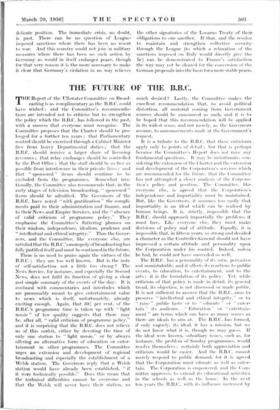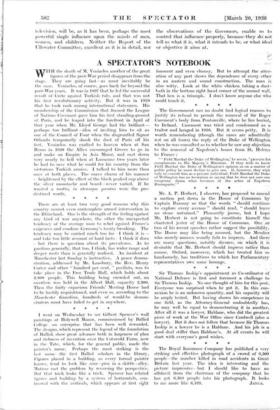THE FUTURE OF TIM B.B.C.
THE Report of the Ullswater Committee on Broad- casting is as complimentary as the B.B.C. could have wished ; and the Committee's recommenda- tions are intended not to criticise but to strengthen the policy which the B.B.C. has followed in the past, with a success that everyone must recognise. The Committee proposes that the Charter should be pro- longed-for a further ten years ; that Parliamentary control should be exercised through a Cabinet Minister free froth heavy Departmental duties ; that the B.B.C. should receive a* larger share of licensing revenues ; that relay exchanges should be controlled by the Post Office ; that the staff should be as free as possible from interference in their private lives ; and that " sponsored " items should continue to be excluded froin the programmes. Somewhat irra- tionally, the Committee also recommends that, in the early stages of television broadcasting, " sponsored " items should be admitted. The Governors of the B.B.C. haVe noted " with gratification" the compli-: ments paid to their administration and finance, and to their News and Empire Services, and the " absence of valid criticism of programme policy." They emphasise the Committee's flattering phrases on their wisdom, independence, idealism, prudence and " intellectual and ethical integrity." Thus the Gover- nors, and the Committee, like everyone else, are satisfied that the B.B.C.'s monopoly of broadcasting has fully justified itself and must be continued in the future.
There Is no need to praise again the virtues of the B.B.C. 3 they are too well known. But is the note of self-satisfaction not a little too strong ? The News Service, for instance, and especially the Second News, does not fulfil its function of giving a clear and simple summary of the events of the day. It is confused with commentaries and interludes which are presumably meant to give entertainment value to news which is itself, unfortunately, already exciting enough. Again, that 33 per cent. of the B.B.C.Es programme time is taken up with " light music" of 'low quality suggests that there may be, after all, 'valid criticism of programme policy," and it is surprising that the B.B.C. 'does not relieve us of this surfeit, either by devoting the time of only one station to " light music," or by always offering an alternative form_ of education or enter- tainment in 'other programmes. The Committee urges an extension and development of regional broadcasting and especially the establishment of a Welsh station. The Governors reply that a Welsh station 'would have already been established, " if it were technically posSible:" Does this mean that the technical difficulties cannot be Overcome and that the WelSh will never have their station, so much desired ? Lastly, the Committee makes the excellent recommendation that, to avoid political distortion, all material coming from Government sources should be announced as such, and it is to be hoped that this recommendation will be applied in its widest sense, and not merely, as the Governors assume, to announcements made at the Government's request.
It is a tribute to the I3.B.C. that these criticisms apply only to points of detail ; but that is perhaps because the Committee's Report does lint raise any fundamental questions. It niay be unii►rtunate, con- sidering the extension of the Charter and the extension and development of the Corporation's services which are recommended for the future, that the Committee has not attempted a closer analysis of the Corpora- tion's policy and position. The Committee, like everyone else, is agreed that the Corporation's independence and impartiality must he maintained. But, like the Governors, it assumes too easily that impartiality is an ideal which can be realised by human beings. It is, strictly, impossible that the B.B.C. should approach impartially the problems it must face. Like everyone else, they must make decisions of policy and of attitude. Equally, it is impossible that, in fifteen years, so strong and decided a character as the Controller-General should not have impressed a certain attitude and personality upon the CorporatiOn under his control. Indeed, unless he had, he could not have succeeded so well.
The B.B.C. has a personality of its own, pervasive and unmistakable, and it affects its reactions to public events, to education, to entertainment, and to the arts : it is the foundation of its policy. Yet, while criticism of that policy is made in detail, its general trend, its objective, is not discussed or made public. It is not sufficient to answer that the B.H.C. aims to preserve " intellectual and ethical integrity," or to " raise " public taste or to " educate " or " enter- tain " its audience. " Education " or " entertain- ment " are terms which can have as mans' senses as there are ideals to aim at. The B.B.C. has formed, if only vaguely, its ideal, it has a mission, but we do not know what it is, though we may guess. If the ideal were known, subsidiary issues, such as, for instance, the probleM of Sunday programmes, would resolve themselves : certainly both appreciation and criticism would be easier. And the B.B.C. cannot merely 'respond to public demand, for it is agreed that the Corporation must educate as well as enter- tain. The Corporation is empowered, and the Com- mittee approves, to extend its educational activities in the' schools as well as the home. In the next ten years the B.B.C., with its 'influence increased by television, will be, as it has been, perhaps the most powerful' single influence • upon the, minds men, women, and children. Neither the Report of the Ullswater Committee, excellent as it is in detail, nor the observations of the Governors, enable us to _contra that influence kproperly; becauseqhey do: not tell us what it is, what it intends to be, or what ideal or objective it aims at.



































































 Previous page
Previous page